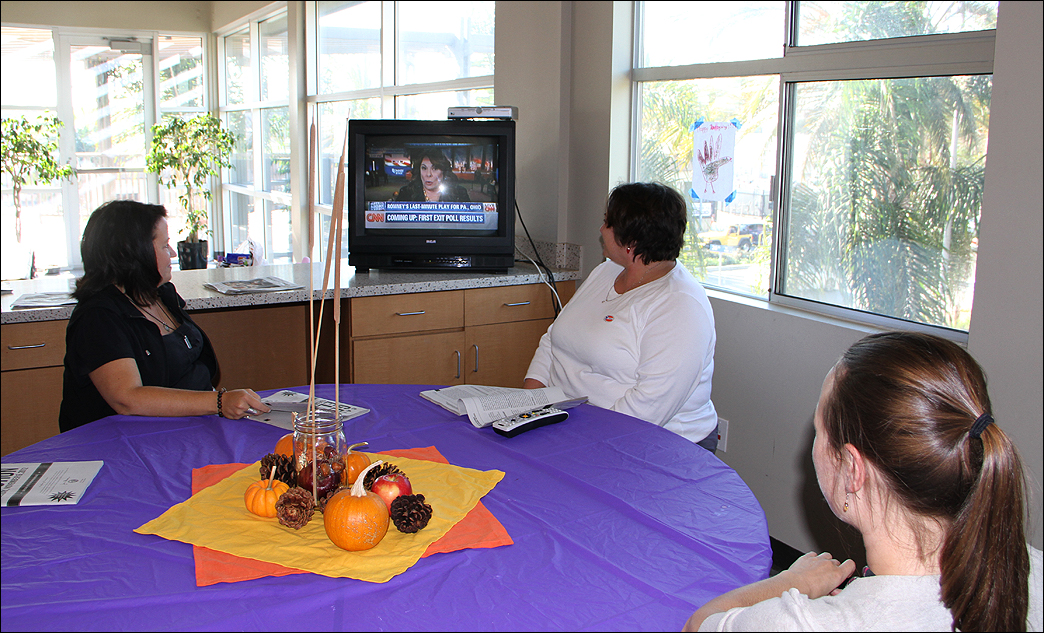
CITY HALL — Sharon Young went to the polls on Tuesday prepared.
She had studied up on the 11 state propositions on the ballot, knew her positions on each and was already stressing that her candidates-of-choice would cross the threshold and beat their opponents.
It was one of the first times that Young felt so knowledgeable about the political process.
"Who would know I had to become homeless first to learn that?" she said, laughing.
Young participates in the Daybreak program, a project of OPCC that supplies homeless women with a safe, accepting environment where they can access information and resources to stabilize their lives and move into permanent housing.
She entered the program only a few weeks ago, and discovered an informal class of about eight women that met on Mondays for an hour to discuss the issues that would appear on the Nov. 6 ballot.
The class, led by Daybreak Director Amy Turk and volunteer Abby Arnold, was new this year, inspired by a desire to inform the women of their right to vote, regardless of their housing situation, and educate them about the issues on the ballot that would directly impact their lives.
Although a few genuinely believed that voting required a roof over one's head, many had simply given up, convinced that their voices would not be heard, Turk said.
"We spent a lot of time trying to convey that your vote is as important as any millionaire's vote, that voting in our nation is the one equalizer," Turk said.
And so began what Arnold referred to as "Civics 101," weekly classes that took place over the course of two months that gave a drop course in how government works and a review of the issues.
Everyone knows about the role of the presidency, Arnold said, but it was only after the women began connecting institutions like hospitals, clinics, libraries and parks to their local governments that the role of cities and counties in the election took hold.
"It was really interesting how when they started relating it to their life, they got interested and engaged," Arnold said.
For Young, the classes helped clarify the intricacies of Propositions 30 and 38, two measures that seek to funnel additional money into California's public schools.
Although they share the same goal, they have been in stiff competition over the preceding months, and differ on how much money each would raise and who, ultimately, would pay for it.
For a person who spent 10 years as a preschool teacher before her circumstances changed, the measures were of critical importance to Young.
"The children are our future," she said.
Approximately 70,000 homeless people nationwide are expected to vote in this election, said Neil Donovan, executive director of the National Coalition for the Homeless.
Many will not know that they can, and others will have been very specifically — and falsely — told that they cannot, he said.
It wasn't always this way. Homeless gained the right to vote in 1993 when then-President Bill Clinton signed the National Voter Registration Act into law.
Better known as the "Motor Voter" bill, the law dictated that a home was not a prerequisite to voting, and that those without one could use a shelter or intersection to indicate an address.
Registration and voting amongst the homeless grew slowly after that, Donovan said.
"Frankly, when we interview people and talk to them about the confusion of their rights, it's much less a creation of their own mind and much more information they've been told by a third party that's incorrect and specifically with the intent of not having them vote," Donovan said.
The homeless and chronically poor rely more on social services, and therefore vote reliably Democratic, he said.
Beyond bad information, voter identification laws passed ostensibly to prevent voter fraud that have taken root in 24 states have become an obstacle to those intent on voting.
Six of those require a photo ID, the remainder do not.
Many homeless do not have access to a government-issued ID required by the laws, and are prevented from getting one by either the cost of the identification itself or the documents needed to get the card, said Heather Johnson, a civil rights attorney with the National Law Center on Homelessness and Poverty.
Even if they can get the money together and locate the documents, rules surrounding birth certificates and Social Security cards can create a catch-22.
"Most state agencies that are charged with putting out birth certificates do require that you have some form of ID to get the birth certificate," Johnson said. "They need an ID to get a document they need to get an ID."
Those arguments hold little water with Tom Fitton, president of Judicial Watch, a conservative organization in favor of the voter identification laws.
"There are always hurdles to voting," Fitton said. "There's registering, maintaining the registration, getting to the polling place or voting absentee.
"The question is if the security of elections is significant enough … to present some kind of identification to show up and vote."
Fitton is fully in favor of making identification cards cheap and available to voters regardless of their housing status, but holds that identification is the easiest way to ensure the perception of a clean vote.
"The more secure elections are, the more likely people are to participate in them," he said.
California does not have a voter ID requirement, although the California Republican Party flirted briefly with the idea earlier this summer before backing down.
In fact, at a time when laws surrounding voting have been constricting all over the country, California made it significantly easier to vote by allowing online registration.
By 2014, voters will have the opportunity to register on election day, throwing the doors open even further.
That fits with Young's voting motto.
"You have to get out and vote, no matter what," Young said. "That's what's important."
ashley@www.smdp.com









